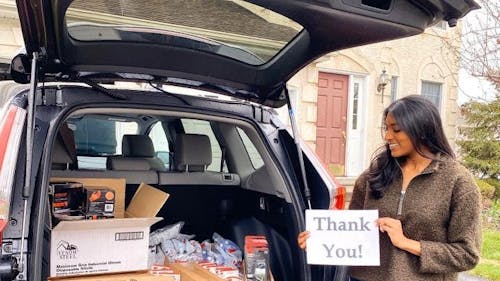Rutgers medical school students work to support healthcare workers fighting coronavirus

After their last rotation in the clinical environment, Danika Baskar and Sally Tarabey, juniors at Robert Wood Johnson Medical School (RWJMS), said they wanted to help the medical workers in another way and helped develop the COVID-19 Medical Student Task Force at RWJMS.
Baskar said she is in charge of the group of students who are calling local businesses, such as nail and tattoo salons and construction businesses, to ask for donations of personal protective equipment (PPE). The organization currently has 30 to 40 RWJ volunteers manning the phone lines reaching out to businesses and 30 undergraduate students who reached out looking to help. Some of the undergraduate volunteers are members of the Health and Medicine Living Learning Community.
When they began their efforts, they said they reached out to PPE to NYC, a similar organization, for guidance.
"They have a really nice streamlined process of reaching out to businesses who might have donations that we're looking for, for healthcare workers," said Baskar.
Similar to PPE to NYC, the RWJ COVID-19 Task Force, consisting of a coalition of medical students, is asking for donations of N95 masks, regular masks, face shields, eye protection, sterile gowns and gloves, according to its flyer.
This task force also meets other concerns by medical professionals, Tarabey said.
"Being in the hospital, you have contacts with doctors and residents and so we would hear about various issues, one of them being the blood shortage," she said.
Tarabey said they encourage people who are healthy and asymptomatic to make individual appointments at local blood donation centers. This reduces the risk from gathering in a large group for a blood drive, but still fulfilling the need caused by a massive blood shortage in hospitals.
Also, two project leaders in the team are currently collaborating with a medical organization to create a national week of awareness for blood donations, drumming up support through social media, she said.
The healthcare workers sometimes reach out to the team themselves, requesting favors. Tarabey said during a code, there was not supposed to be too many medical staff in one room, so the group would have to split. She said the group outside of the room found it hard to communicate with the team inside because the glass walls separating them were too thick.
"They asked if there was any way we could obtain walkie talkies for their communication, so that was one thing that we were able to do for them," Tarabey said.
While this task force currently services the RWJMS, Tarabey said it has been in collaboration with medical schools across the state. One such collaboration has been with the Rutgers New Jersey Medical School (NJMS) Student COVID-19 Team, she said.
The NJMS COVID Team has a resource acquisition branch, which includes a team that focuses on PPE and a wellness team that works specifically in support of the healthcare workers, said Catherine Ye, a sophomore at Rutgers NJMS. She is the co-leader for the wellness team.
"Volunteers are responsible for contacting companies and organizations to acquire resources like supplies, meals, food donations, monetary donations to our GoFundMe and other items that support the wellness and wellbeing of our brave healthcare workers," Ye said.
Ye said she has written guides and email templates for volunteers to use alongside her co-leader Jason Oettinger, a Rutgers NJMS sophomore. She said Oettinger has streamlined processes to make it easier for volunteers to keep track of who they are contacting.
Currently, the NJMS team has grown to include 40 volunteers, Ye said. These volunteers comprise of medical students, graduate students, physician assistant students, undergraduate students and also neighborhood participants.
Ye said the wellness team for NJMS focuses on keeping a Wellness Room stocked within the hospital, which offers healthcare workers a place to rest during a busy shift.
"In general, we make our mission very clear - we're here to support our healthcare and frontline workers," Ye said. "During times like these, we have been touched and humbled by how many individuals and businesses have been willing to help out however they can."
Tarabey and Baskar said it is important for everyone to stay informed and make sure to keep themselves healthy.
"We definitely would love to kind of continue (the communication) between hospitals and other residents and doctors working in different areas, just so we can kind of best serve our needs and keep everything going strong," Tarabey said. "These are our colleagues and these are our mentors and our teachers that are on the front line. And so, we want to do everything we can to support them."
Editor's Note: A previous version of this article referred to Catherine Ye and Jason Oettinger and did not refer to the resource acquisition branch of the NJMS team.



